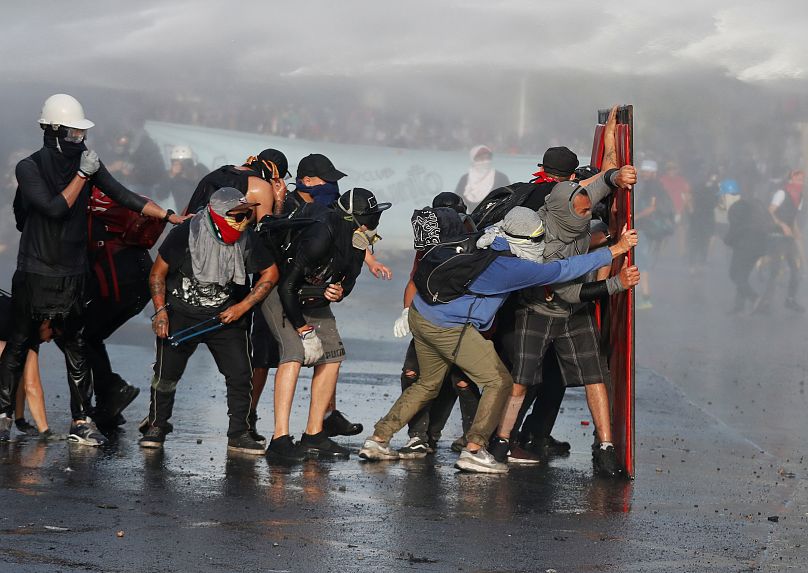What could have been a heavy blow for Chile’s environmental movement has turned into a new opportunity, activists say.
Social unrest and mass protests over inequality and injustice have paralysed Chile for six weeks.
The uprising, in which more than 23 people have been killed and thousands more injured, forced president Sebastian Piñera to pull out of hosting the COP25 climate summit, blaming the country’s “difficult circumstances.”
Allegations of grave human rights violations have continued to damage Chile’s reputation abroad, and Piñera has said he will not attend the conference.
Chile’s participation in the UN climate negotiations is likely to be minimal — a stark contrast from the leadership envisioned 11 months ago when the Chile was announced as host country.
But what could have been a heavy blow for Chile’s environmental movement has turned into a new opportunity, activists say.
“Losing COP is a shame, but the mobilisation is a better opportunity,” says Maria Josefina Correa, regional director of political unity at Greenpeace Chile. “You cannot only talk about the climate crisis, you have to also talk about governability. Social and environmental justice must be driving governments.”
In the run up to the COP, Piñera had outlined plans for Chile to be one of the world’s first carbon neutral countries, stating that while the country accounts for 0.25% of the planet's emissions, it is one of the 10 most vulnerable nations to climate change.
“The COP was a really good instance to put the environmental agenda on the front page,” says Correa. “but after the social explosion I think we have the possibility to go further in this context.”
Consitutional reform in Chile
Many activists in Chile were sceptical of Pinera’s moves to host the climate change conference in the first place, citing Chile’s own state-driven environmental issues, such as the “sacrifice zones” — areas where pollution from unregulated industries has irreversibly contaminated land, water and air, directly affecting communities.
“Climate action is very connected to fundamental human rights,” says Jorge Canales, a former vice-Minister of Environment. For this reason, the climate crisis has emerged as a key part of Chile’s social unrest, alongside rising inequality, the cost of living and state repression.
While Canales laments that important climate protection plans have lost political momentum the wake of COP’s cancellation, he shares Correa’s belief — that more will be achieved in the long-term.
“There is an opportunity now, whereas COP is centered on an event, like a festival. Maybe nothing solid would have been resolved afterwards,” he says. “Now, the conversation about climate change is a lot deeper.”
Among the protesters’ demands is reform of Chile’s neoliberal economic model and for the country’s dictatorship-era Constitution be rewritten. The 17-year military regime of Augusto Pinochet, which ended in 1990, introduced the privatization of water and oversaw the mercantilization of natural resources.
Activists are now focusing on bringing environmental protection into a new constitution.
“The best opportunity we have in Chile, rather than COP, is writing the new constitution,” says Clemente Perez, a spokesperson for Extinction Rebellion in Santiago. “That would be a great opportunity for climate activism, we have to focus on that.”
“COP was an opportunity for Chile to show the sacrifice zones, the contamination – that is now lost,” says Josefa Solis, who was among those taking part in a march alongside Fridays for Future in Santiago on Friday. “But we hope that all the social mobilisations can show this.”
In tourism, 'everybody has lost'
While the social unrest and loss of COP25 in Chile may have opened new doors for environment activists, it has dealt a heavy economic blow.
The event had been expected to generate over $31 million (€28 million) for the tourism industry, drawing in more than 25,000 people, according to business tourism federation, FEDETUR.
“In terms of business tourism, COP was the largest event that Chile’s has ever had,” says Helen Kouyoumdijan, vice president of FEDETUR, adding that employment in the tourism industry has dropped 10% since the protests began.
“The cancellation has had a strong impact on those who were set to benefit from it,” she says. “Not just in terms of accommodation, but also restaurants, transportation, souvenir sellers.”
The unexpected loss of this income has been problematic among small businesses, especially in the hotel and restaurant sectors.
Tati Moyana sits inside her guesthouse in central Santiago, looking at a diary on her laptop with rows of cancellations. With just a few days before COP25, her rooms should have been full.
“It’s very bad, there are cancellations every day – and this was meant to be high season. Everybody has lost.”
Although it is difficult now, Tati, who has hung up signs stating “Renuncia Pinera” on her gate, says she believes in the social movement.
“This had to happen. There was no way we could get away with living like this. It had to be now.”













